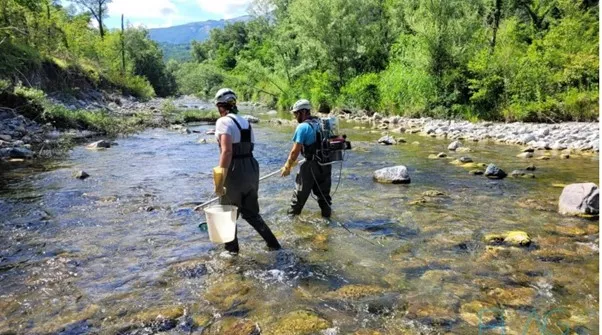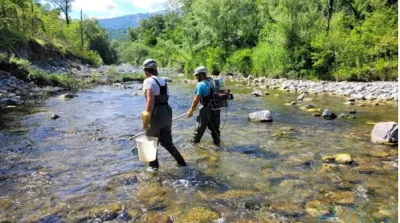Summary
River Contracts is a project led by the Fishery Local Action Group (FLAG) Coast to Coast to revitalise the Noce and Sinni rivers, through a co-designed plan involving institutions, associations and citizens. During the 2020-2023 period, the project developed an action-oriented manifesto, implemented four pilot activities to rejuvenate the river basins and create new tourism opportunities, and set up an educational programme benefiting over a thousand students in the coastal area.
Results
Each project area set up a multi-stakeholder thematic table to gather ideas from local residents. This resulted in four pilot initiatives to revitalise the river areas, including activities to rejuvenate water-related spaces and generate new tourism prospects.
The project designed and implemented the environmental education programme EDUCAFIUME which engaged approximately 1 000 students and teachers from two schools by the end of 2023. The programme kicked off with an analysis of local characteristics, biodiversity and the state of water bodies, following which students discussed potential actions within the River Contracts framework.
Several workshops took place in the area of the two river basins, where the schools are located, led by experts and operators of the fishery and culture sectors.
Resources
Documents
Context
Basilicata is one of 13 regions adhering to Italy’s National Charter of River Contracts. Its local FLAG, Coast to Coast, is responsible for implementing the process for the Noce and Sinni rivers.
The area's river ecosystem was deteriorating continuously due to frequent floods and droughts, exacerbated by climate change, which jeopardised river activities and the related local culture, seriously affecting local development.
To address these challenges, the project proposes a redevelopment, management and enhancement of the river basins and their surrounding areas. The goals are to revive river-related activities and the local culture, prevent ecosystem abandonment, address climate change impacts, mitigate flood and drought risks, and thus contribute to local development.
Objectives
The primary objective is to enrich this coastal territory by strengthening local skills, creating new cultural experiences and raising awareness of the activities and cultural heritage of small-scale artisanal fishing among local administrators, tour and restaurant operators, local families and tourists.
The project particularly aims to engage younger generations in its participatory process in order to increase the sense of responsibility and engagement in the management of local natural resources.
Activities, key actors, and timeline
The River Contracts project kicked off following a baseline cognitive analysis, approved by the FLAG’s board of directors in autumn 2020.
It produced the ‘Manifesto of intent towards river contracts of the Noce and Sinni valleys’ delineating key actions: evolving professions on biodiversity; tracking scientific-technical trends; promoting public participation; safeguarding cultural heritage; and conducting studies. The manifesto was shared with municipal mayors within the two rivers’ catchment areas, as well as with associations and citizens to maximise participation in the planning process.
The project undertook thematic discussions and pilot activities, including four thematic tables focusing on each specific river area, to gather ideas and promote participation.
This resulted in the following pilot initiatives:
-
‘Enhancement of the Noce River, Ponte Grande location’ to convert an ecological isle into a reception and educational centre; and
-
‘From lands to rivers, toward a new concept of environmental sustainability in the participatory framework of the 2030 Agenda’ to create an information and education network.
These initiatives aim to promote knowledge of local fisheries' performance and services, enhancing coastal territories' opportunities.
Success factors/lessons learnt
Collaborative governance, incorporating active participation from local communities and an integrated approach to water resource management, stands as a cornerstone for the success of this project. By involving communities in the decision-making and implementation, the project encourages a sense of ownership and responsibility, particularly among the youth.
However, challenges abound, including resistance to change, conflicting stakeholder interests, bureaucratic obstacles and financial constraints. Yet, amidst these issues lie significant opportunities, such as identifying mutually beneficial solutions, harnessing innovative technologies, securing external funding and partnerships, and aligning with broader sustainable development goals.
The replicability of the project depends on contextual factors such as local socio-economic and environmental conditions, effective governance structures and stakeholders' willingness to collaborate.
The sustainability of the project results requires reflection on both financial and environmental considerations. Long-term success depends on continuous funding which may be secured through public-private partnerships, user fees, grants and other financial instruments. Regular assessment of the environmental impact ensures a sustainable approach, prioritising the ecological well-being of the river basin and safeguarding against long-term harm to the environment.
Contacts
Salvatore Lobreglio, FLAG Director: contrattodifiume.basilicata@gmail.com; +39 3383072677

